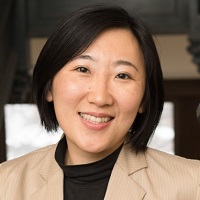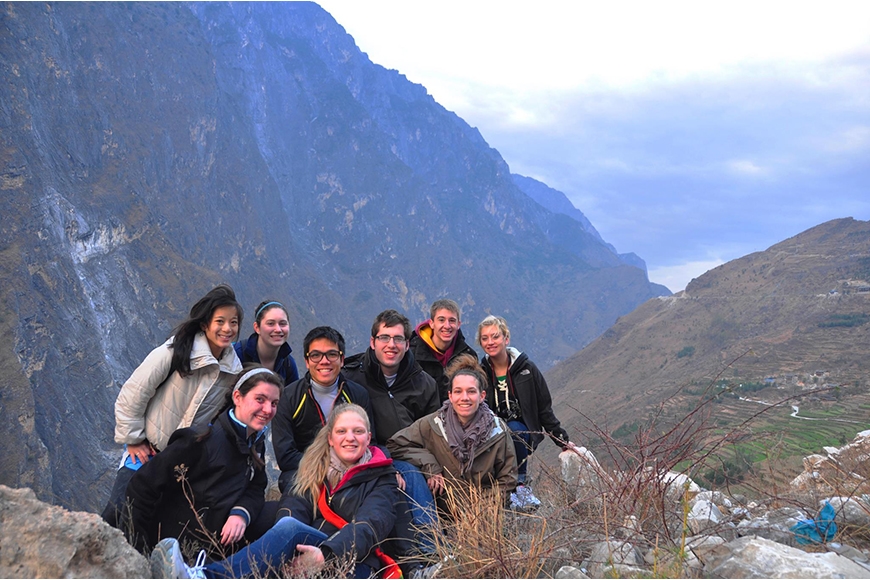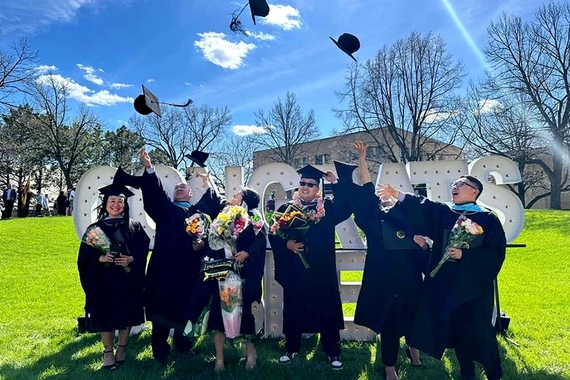The Chinese Flagship Program: Creating Global Citizens
Established in 2014, the Chinese Flagship Program prepares UMN students to be global professionals fluent in Chinese language and culture.
Now, the renewal of the Chinese Flagship Grant will take Chinese language and culture instruction and immersion even further. The University expects to receive as much as two million dollars toward the program over the course of four years. From intensive professional language courses to overseas study abroad programs and internships, the Chinese Flagship Program is creating global citizens.
Associate Professor Ning Ma directs the Chinese Flagship Program, which is administered by the Department of Asian & Middle Eastern Studies (AMES). She explains what makes the program so remarkable and what renewed funding means for students.

Can you describe your position as director of the Chinese Flagship Program?
I see my role as a facilitator. The mission of the program is to provide substantial financial, academic, administrative, and social resources for studying Chinese language and culture, as well as to expedite or enable the goals of undergraduate students who aspire to become global professionals.
Another important aspect of my directorship is creating synergy between the program and the [AMES] department, the College [of Liberal Arts], and the University at large. I have to thank our associate director, academic advisor, program assistant, affiliated instructors, as well as tutors and student workers for the diverse day-to-day operations of the program. They are doing the heavy lifting in the program. Without their dedication and innovation my work as the Flagship director would not have been possible.
What are some things the Chinese Flagship Program has done so far?
The program was established in 2014 and has had profound impacts on the Chinese language and culture curriculum. Course additions include advanced Chinese language courses at the 5000-level, Classical Chinese courses, and Flagship-track courses on professional and practical language applications. The Chinese program has established proficiency standards for each level, and the Certificate of Advanced Chinese was instituted for Flagship purposes.
The program has also stimulated many extracurricular programs and cultural events for campus and community outreach. One case is the establishment of the Chinese Language and Culture House in 2018, through which Chinese language learners and international students from China interact as a living and learning community. Flagship also co-sponsors with the Language Center the Culture and Language Integration in Chinese (CLIC) program, which facilitates guided bilingual conservations [between] high-school students graduating from Chinese immersion schools and international students from China. The Flagship program issues a bilingual newsletter that has readership across the Twin Cities area and beyond.
The grant provides generous scholarship for summer study abroad and the capstone year, during which students take college direct-enrollment courses and participate in internships in locations such as Nanjing, Shanghai, Beijing, and Taipei. It also supports intensive domestic summer courses, and funds individual tutoring for all enrolled students on a weekly basis during the academic semesters. Over one hundred UMN students have benefited from these financial and educational supports. Furthermore, Flagship students have access to a well-supported network of overseas partners.
Even though the UMN Flagship program is relatively young, we have seen graduates who are now in law firms, business consulting, academic research, and the entertainment industry. Their Chinese language skills, overseas internship experiences, as well as cultural and historical knowledge about China have set them apart from their peers. We look forward to the further blossoming of their careers in global professional fields.
What are some hopes you have for the future of the Chinese Flagship Program?
The program was founded by Professor Joseph Allen, the former director and chair of the Department of Asian Languages & Literatures (now the Department of Asian & Middle Eastern Studies). In a recent interview he did for the Flagship newsletter, he stated that the presence of the program on campus may “change how universities think about language studies—that is, as a core rather than a peripheral subject.” This is my hope for the future of the Chinese Flagship program as well.
Language study should not be perceived as service tools, but as the heart and soul of the global workforce, as well as of global citizenship. Language study reflects one’s most serious commitment to a foreign culture. In many ways, it is genuinely life-changing. Hopefully the success of the Flagship program can offset the unsettlingly marginalized position of foreign language and culture study in this country, especially during this moment in history when the needs for multilateral understanding and cooperation across nations and cultures are greater than ever.
How does studying another language and culture influence how you think?
I grew up in Beijing and started learning English in middle school. I majored in English language and literature at Beijing University because of my love for books and my interest in the outside world. The same interest motivated me to travel to the US as a graduate student of comparative literature in the early 2000s.
Since then I have been studying and living here, now as a scholar of China studies and comparative literature. I have made this life choice since I have realized how fascinating and important it is to introduce a more holistic and humanistic vision of China in American higher education. Meanwhile, I have been profoundly transformed in the process of intercultural communication as well, as I gradually opened myself up to diverse perspectives on questions I previously thought to have only one possible answer.
According to a popular quote attributed to Charlemagne, “To have another language is to possess a second soul.” While diving into the intricacies of a different language, one gains cultural, historical, and analytical perspectives, while experiencing senses of accomplishments, moments of humility, and epiphanies of empathy that few other forms of learning could generate.
Needless to say, this is a process that builds connections between people and places. Studying another language is like acquiring a second brain, a second soul, and likely a second home.
What do you wish more people understood about the Chinese Flagship Program?
First of all, you can join the program while pursuing any major degree at the University of Minnesota. We have enrolled students from all UMN colleges. Our academic advisor Ms. Claudia Hasegawa has three decades of advising experience at the U and works with Flagship students individually on their degree plans.
Second, you do not need to have learned Chinese before college to join the program. Many of our students started their Chinese language study at the University of Minnesota. It is not too late to join the program if you start learning Chinese in your sophomore year, or even junior year. We fund summer intensive courses that are equivalent to one year of the regular curriculum. Because of this support, we have had students who achieved advanced language proficiency after two years of study.
Third, do not let financial difficulty stop you from attending the Flagship. The Flagship is the most generously funded study-abroad program I am aware of. At the UMN, thanks to the Provost Scholarship pledged by the former Provost Dr. Karen Hanson, we are able to fully fund a whole year of academic study and internship during the capstone year. Generous funding is also provided for domestic and overseas summer courses. Furthermore, our students are in a very competitive position to win prestigious national scholarships such as the Boren Scholarship and the FLAS (Foreign Language and Area Studies) Scholarship. We are always willing to hear from our students regarding their financial needs and have dedicated staff members working closely with financial aids on scholarship distribution.
What do students get out of participating in the Chinese Flagship Program?
A student’s education can be enhanced in many ways by joining the Flagship program. The substantial scholarship offered through the program virtually eliminates the financial hurdles for many students to pursue study-abroad opportunities. The exclusive Flagship network and services during the capstone year offer not only high-quality, individualized academic and internship experiences, but also preparations for post-graduate careers and federal employment.
In terms of curriculum, Flagship students [take advantage of] a range of advanced language and culture courses, including those that are open only to enrolled students to train them in the professional application of Chinese and prepare them for living and studying in a Chinese-speaking environment.
On campus, we host a variety of extracurricular and cultural events that facilitate connections between Flagship students and native speakers from China, both from the U and around the Twin Cities community.
UMN is a large public university, but Flagship can provide a personalized, first-class academic opportunity for advanced Chinese language and culture study in ways that are comparable to, or exceed, Ivy League institutions and the nation’s top liberal arts colleges. We are proud of the human talents and rich resources within the program, and look forward to facilitating more and more aspiring UMN students on their pathway towards becoming future leaders in diverse global professions.
Learn more and apply to the Chinese Flagship
This interview was conducted by an undergraduate student in Backpack. Meet the team.



